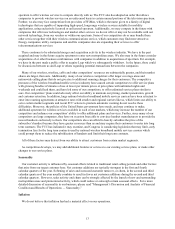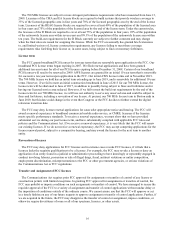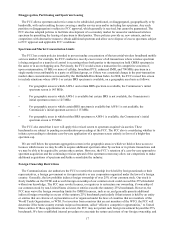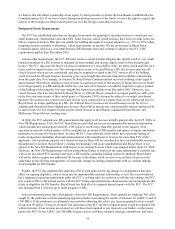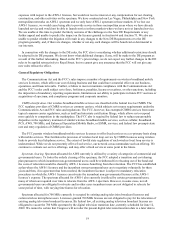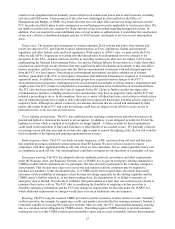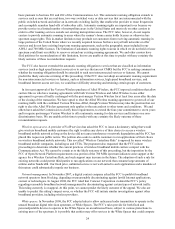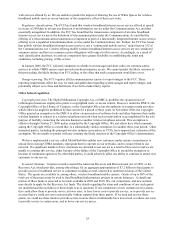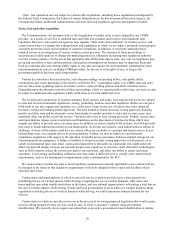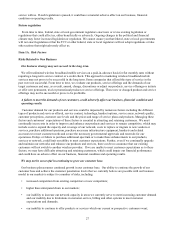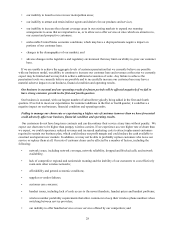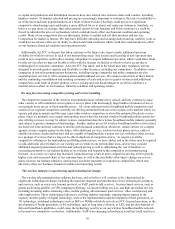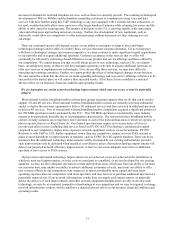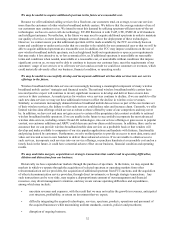Metro PCS 2008 Annual Report Download - page 31
Download and view the complete annual report
Please find page 31 of the 2008 Metro PCS annual report below. You can navigate through the pages in the report by either clicking on the pages listed below, or by using the keyword search tool below to find specific information within the annual report.22
ETCs under the USF, pending comprehensive reform that is now under consideration by the agency. We may decide
in the future to apply for an ETC designation in certain qualifying high cost areas where we provide wireless
services, though our ability to qualify may be affected by ongoing changes and possible future limitations in the
program. If we are approved, these payments would be an additional revenue source that we could use to support the
services we provide in high cost areas.
Regulatory fees. We are obligated to pay certain annual regulatory fees and assessments to support FCC wireless
industry regulation, as well as fees supporting federal universal service programs, number portability, regional
database costs, centralized telephone numbering administration, telecommunications relay service for the hearing-
impaired and application filing fees. These fees are subject to change periodically by the FCC.
Equal access. CMRS carriers are exempt from the obligation to provide equal access to interstate long distance
carriers. However, the FCC has the authority to impose rules requiring unblocked access through carrier
identification codes or 800/888 numbers to long distance carriers so CMRS customers are not denied access to their
chosen long distance carrier, if the FCC determines the public interest so requires. Our customers have access to
alternative long distance carriers using toll-free numbers.
Customer proprietary network information (CPNI). FCC rules impose restrictions on a telecommunications
carrier’s use of customer proprietary network information, or CPNI, without prior customer approval, including
restrictions on the use of information related to a customer’s location. The FCC has imposed substantial fines on
certain wireless carriers for their failure to comply with the FCC’s CPNI rules. The FCC previously conducted a
broadscale investigation into whether CMRS carriers are properly protecting the CPNI of their customers against
unauthorized disclosure to third parties. In February 2006, the FCC requested that all CMRS carriers provide a
certificate from an officer based on personal knowledge that the CMRS carrier was in compliance with all CPNI
rules and the filing of such a certificate has now become an annual requirement. We provided the certificate in
February 2006 and have provided the required annual certificates since then.
Revised CPNI rules became effective in December 2007 that required us to make certain changes to our business
practices or processes. Among other things, CMRS carriers now must take reasonable measures to discover and
protect against pretexting and, in enforcement proceedings, the FCC will infer from evidence of unauthorized
disclosures of CPNI that reasonable protections were not taken. The FCC also is seeking comment on additional
CPNI regulations.
Congress and state legislators also may pass legislation governing the use and protection of CPNI and other
personal information. For example, Congress enacted the Telephone Records and Privacy Protection Act of 2006,
which imposes criminal penalties upon persons who purchase without a customer’s consent, or use fraud to gain
unauthorized access to, telephone records. In addition, certain states have enacted, and other states in the future may
enact, legislature relating to customer personal information. The recent and pending legislation (if enacted) may
require us to change how we protect our customer’s CPNI and other personal information.
Services to persons with disabilities. Telecommunications carriers are required to make their services accessible
to persons with disabilities. These FCC rules generally require service providers to offer equipment and services
accessible to and usable by persons with disabilities, if readily achievable, and to comply with FCC-mandated
complaint/grievance procedures. These rules are largely untested and are subject to interpretation through the FCC’s
complaint process. While these rules principally focus on requirements that must be met by the manufacturers of
wireless equipment, we are required to have a certain percentage of our handsets be hearing aid compatible and we
have annual reporting requirements. Because of the ongoing consolidation in the digital wireless handset
manufacturers industry and in the wireless industry, we may have difficulty securing the necessary handsets in order
to meet any additional FCC requirements. In addition, since we are required to offer these hearing aid-compatible
wireless phones for each air interface we provide, this requirement may limit our ability to offer services using new
air interfaces other than CDMA 1XRTT, may limit the number of handsets we can offer, or may increase the costs
of handsets for those new air interfaces. Further, to the extent that the costs of such handsets are more than non-
hearing aid-compatible digital wireless handsets, demand for our services may decrease, the number of wireless
phones we can offer to our customers may decline, or our selling costs may increase if we choose to subsidize the
cost of the hearing aid-compatible handsets.
Backup power requirements. In October 2007, the FCC adopted rules which, if they had taken effect, would have
required us to maintain emergency backup power for a minimum of twenty-four hours for certain of our equipment
that is normally powered from local commercial power located inside mobile switching offices, and eight hours for



